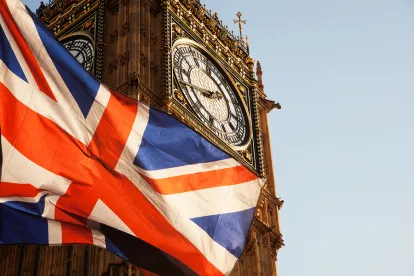Negotiations between the United Kingdom (U.K.) Government and the European Union (EU) on their post-Brexit relationship will continue into their fourth round on 1 June, following three negotiating rounds that have so far been inconclusive. If this continues, the U.K. and EU must mutually agree by the end of June whether to extend the transition period beyond 2020. If they decide not to extend, and they do not reach an agreement on their new trading terms, the U.K. will leave the EU Single Market and Customs Union on so-called World Trade Organisation terms.
It is in this context that on 19 May 2020, the U.K. Department for International Trade released details of the new U.K. Global Tariff (UKGT) regime that will apply for all goods entering the U.K. The UKGT will replace the European Union Common External Tariff (EUCET) and will come into effect once the transition period ends on 31 December 2020.
The UKGT will be the default position for importers (known as the WTO “Most Favoured Nation” terms) unless one of these three exceptions apply:
- The U.K. has signed a Free Trade Agreement (FTA) with the country the goods originate in.
- The goods qualify for a relief or tariff suspension.
- For instance, due to the Covid-19 Pandemic, medical supplies and protective equipment imported into the U.K. that would normally be subject to duties qualify for relief from them.
- The imported goods originate in countries that are part of the U.K. Generalised Scheme of Preferences (U.K. GSP).
- This scheme reduces or eliminates tariffs on imports from some developing countries into the U.K.
- The E.U. GSP will apply to the U.K. until 31 December 2020, after which the U.K. GSP will continue to provide the same preferences as the E.U. GSP.
The U.K. Government has a useful UKGT tool to check what tariff will be applied to specific goods. This is searchable by commodity code and/or product description and includes direct comparisons against the EUCET for a quick confirmation of what has changed.
It is important to note that this new tariff regime will only be applied to goods as they enter the U.K. customs territory, and does not cover other duties such as VAT and trade restrictions like anti-dumping policies or consumer safety regulations.
The UKGT will lower many tariffs on imports as compared to the tariffs applied under the EUCET. The goal of the U.K. Government is to simplify and lower the tariff regime as much as possible as compared to the EUCET. For instance, the UKGT will remove tariffs on products that are used in U.K. production, or currently are subject to a “nuisance” tariff of under 2%. It also reduces or eliminates tariffs on products that will help in promoting a greener economy, such as LED lights and new thermostats. The Government says that it is aiming to have 60% of imports tariff free under the UKGT, as compared to 47% of imports that are currently tariff free under EUCET.
However, as the U.K. Government continues talks with the EU, United States and other trade partners on potential FTAs, the UKGT could not reduce all tariffs to zero, as there would be less incentive for other countries to conclude FTAs. For instance, in strategically important industries, the UKGT will impose a 10% duty on cars, as well as tariffs on certain agricultural products such as lamb, beef and poultry. These tariffs will likely be used as a bargaining leverage in future trade talks.
The UKGT is an important step to enable U.K. and overseas businesses to understand the U.K.'s post-Brexit trading rules. These tariffs will be the default position, no matter what happens in the politically fraught negotiations, so there will now be a level of certainty as the rest of the year progresses. However, the UKGT only deals with tariffs. The ongoing negotiations between the EU and U.K. as well as the U.S. and U.K. will likely involve the reduction of other important trade barriers, such as regulatory, competition and anti-dumping provisions. Businesses will need to be aware of these developments as they arise.






 />i
/>i

